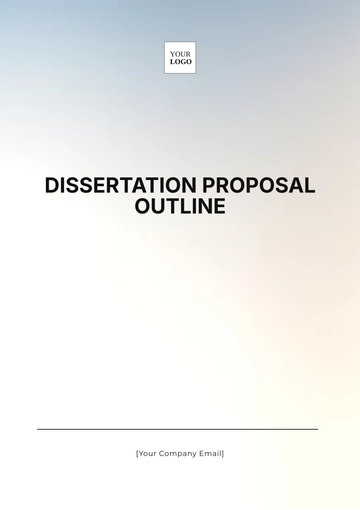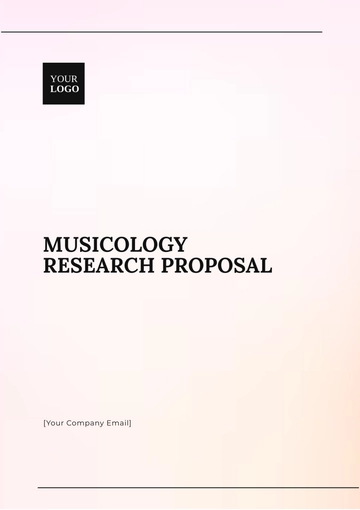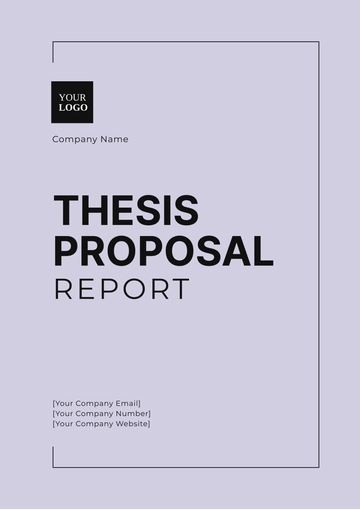Free Qualitative Academic Research Proposal

Institution: [YOUR COMPANY NAME] | Address: [YOUR COMPANY ADDRESS]
I. Introduction
In the contemporary educational landscape, online learning has become an increasingly prevalent mode of instruction. This qualitative academic research proposal aims to explore student perceptions and engagement in online learning environments. The insights derived from this research can provide valuable information for educators and policymakers to enhance the efficacy of online education.
II. Research Questions
How do students perceive the online learning environment?
What factors influence student engagement in online learning?
How does the online learning environment impact student academic performance and satisfaction?
III. Literature Review
Previous studies have indicated a range of factors that affect student perceptions and engagement in online learning. Key themes identified include instructional design, interaction and communication, technological challenges, and the flexibility of online learning platforms. This research seeks to build on existing literature by providing a comprehensive analysis of these themes through the students’ lived experiences.
Author(s) | Year | Key Findings |
|---|---|---|
Johnson & Aragon | 2053 | Effective online learning requires interactive and collaborative activities. |
Moore & Kearsley | 2055 | Student satisfaction is dependent on timely feedback and support from instructors. |
Hrastinski | 2058 | Active engagement is higher in synchronous online learning environments. |
IV. Methodology
A. Research Design
This study employs a qualitative research design using semi-structured interviews to gather rich, detailed data on student perceptions and engagement in online learning environments. A purposive sampling method will be used to select participants from diverse academic backgrounds and online learning experiences.
B. Data Collection
Participants: 20 undergraduate and graduate students.
Interviews: Conducted via video conferencing platforms to ensure accessibility and convenience.
Duration: Each interview will last approximately 45-60 minutes.
Informed Consent: Participants will be provided with detailed information about the study and asked to sign a consent form.
C. Data Analysis
Thematic analysis will be employed to identify, analyze, and report patterns within the data. The analysis will involve coding the data to identify key themes related to student perceptions and engagement. Data triangulation will be used to enhance the validity and reliability of the findings.
V. Ethical Considerations
Ethical approval will be sought from the university's Institutional Review Board (IRB) before the commencement of the study. Measures will be taken to ensure the confidentiality and anonymity of the participants. Participants will be informed of their right to withdraw from the study at any time without any consequences.
VI. Expected Outcomes
The results of this study are expected to provide in-depth insights into the factors influencing student perceptions and engagement in online learning environments. These findings can help educators design more effective online courses and foster a supportive and engaging learning experience for students.
VII. References
Johnson, S. D., & Aragon, S. R. (2053). An instructional strategy framework for online learning environments. New Directions for Adult and Continuing Education, 2003(100), 31-43.
Moore, M. G., & Kearsley, G. (2055). Distance Education: A Systems View of Online Learning. Cengage Learning.
Hrastinski, S. (2058). Asynchronous and synchronous e-learning. Educause Quarterly, 31(4), 51-55.
- 100% Customizable, free editor
- Access 1 Million+ Templates, photo’s & graphics
- Download or share as a template
- Click and replace photos, graphics, text, backgrounds
- Resize, crop, AI write & more
- Access advanced editor
Craft compelling research proposals with the Qualitative Academic Research Proposal Template from Template.net. This customizable template provides a clear framework for presenting qualitative research ideas and methodologies, ensuring your proposal stands out. Editable in our AI Editor Tool, it allows for seamless adjustments and personalization. Make this template yours now!
You may also like
- Business Proposal
- Research Proposal
- Proposal Request
- Project Proposal
- Grant Proposal
- Photography Proposal
- Job Proposal
- Budget Proposal
- Marketing Proposal
- Branding Proposal
- Advertising Proposal
- Sales Proposal
- Startup Proposal
- Event Proposal
- Creative Proposal
- Restaurant Proposal
- Blank Proposal
- One Page Proposal
- Proposal Report
- IT Proposal
- Non Profit Proposal
- Training Proposal
- Construction Proposal
- School Proposal
- Cleaning Proposal
- Contract Proposal
- HR Proposal
- Travel Agency Proposal
- Small Business Proposal
- Investment Proposal
- Bid Proposal
- Retail Business Proposal
- Sponsorship Proposal
- Academic Proposal
- Partnership Proposal
- Work Proposal
- Agency Proposal
- University Proposal
- Accounting Proposal
- Real Estate Proposal
- Hotel Proposal
- Product Proposal
- Advertising Agency Proposal
- Development Proposal
- Loan Proposal
- Website Proposal
- Nursing Home Proposal
- Financial Proposal
- Salon Proposal
- Freelancer Proposal
- Funding Proposal
- Work from Home Proposal
- Company Proposal
- Consulting Proposal
- Educational Proposal
- Construction Bid Proposal
- Interior Design Proposal
- New Product Proposal
- Sports Proposal
- Corporate Proposal
- Food Proposal
- Property Proposal
- Maintenance Proposal
- Purchase Proposal
- Rental Proposal
- Recruitment Proposal
- Social Media Proposal
- Travel Proposal
- Trip Proposal
- Software Proposal
- Conference Proposal
- Graphic Design Proposal
- Law Firm Proposal
- Medical Proposal
- Music Proposal
- Pricing Proposal
- SEO Proposal
- Strategy Proposal
- Technical Proposal
- Coaching Proposal
- Ecommerce Proposal
- Fundraising Proposal
- Landscaping Proposal
- Charity Proposal
- Contractor Proposal
- Exhibition Proposal
- Art Proposal
- Mobile Proposal
- Equipment Proposal
- Student Proposal
- Engineering Proposal
- Business Proposal





























